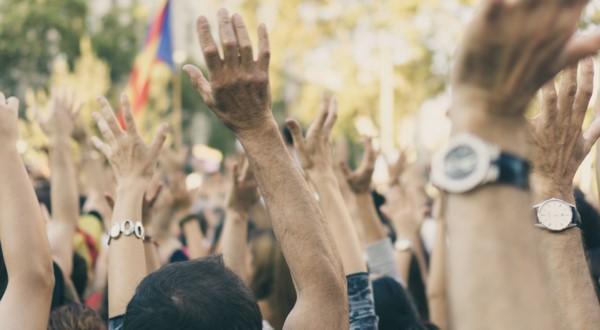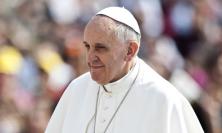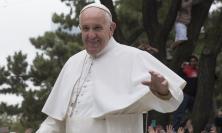In the second part of his interview with Jan Regner SJ about Fratelli tutti, James Hanvey SJ reflects on the rise of populism. In many countries today, populism is growing, and the truth is being misused to the benefit of politicians. How can we reflect on this from the perspective of Pope Francis’ new letter?
- Read part 1: Freedom, joy and friendship >>
It is interesting that Fratelli tutti devotes an important section to this and also to a critique of neo-liberalism, economically and politically (§154). In this, it stands within the great tradition of Catholic Social Thought. The Church does not advocate one political or economic model, but it does set out the principles that should guide all models. The basic one is that the common good, the lasting human good, is the end to which all political thought is ordered. This will also include special attention to those who are deliberately or inadvertently excluded; a humane society will also seek to protect and care for the vulnerable and powerless. One of the most remarkable aspects of the Old Testament is God’s concern for the poor, for justice and the obligations of the elite not to govern only for themselves or to exploit the poor and the powerless, but the reverse: to provide for them and defend them. Only in this way will society flourish. Not only does the Old Testament present a remarkable vision of God, but also of the society that God wants for us. Of course, this is actually performed in the New Testament by Jesus’s actions, and especially in the Beatitudes. The resurrected Christ is the guarantor of a resurrected humanity. In this context, the Church has a mission to alert us to the dangers of ‘false prophets’ and movements. We know in Europe what this means because we have lived with the consequences for so many generations and the price has been too high. In times of great transition, when our societies feel under threat and life appears even more precarious than usual, it is always tempting to allow ourselves to be seduced by these ‘false prophets’ or want to return to the captivity of Egypt. The Old Testament scholar, Walter Brueggemann, reminds us that Pharaoh is an image of all the powers that would seek to enslave us. The experience of Covid-19 has also shown us that we cannot stand on our own. We need an international community; we need the talents of all our peoples and our friends; and we also need systems that will ensure a just distribution of vaccines and of any financial aid that is necessary to sustain economic life and order. We have seen that ideologies fade before such a universal threat and that change is possible when we have both the will and the imagination to make it happen. Yet, as we have seen, Fratelli tutti also recognises the need for the local, indeed, the restoration of the civic sphere to national life. This distribution of power and responsibility, with a proper understanding of the Catholic social doctrine of subsidiarity, can actually re-balance our systems and help to remove the fears that ideologies manufacture and exploit. Of course, as Fratelli tutti also recognises, we need a new sort of politics and political discourse that respects its people enough to value truth, to recognise the facts, and to engage in rational arguments which are open to critique and judgement in pursuit of solutions to the urgent social, human and ecological challenges that we face. We all know the complexities of the circumstances and the challenges we face; we are mature enough to recognise that there is no easy solution, but we need governments and leaders who can mobilise the generosity, creativity and gifts of the whole community if we are to create a better home for all.
I think, though, we should not dismiss ‘populism’ without first trying to understand it. For me, it somehow contains a cry of pain and despair, which politicians have used without ever addressing. There is certainly an anger and a fear of people who themselves feel left behind and marginalised. It is one of the great gifts of Pope Francis that he knows how to ‘listen’ – not just at a superficial level, but to the language of the heart and of the soul. This is a deep, open, humble and respectful act. I wonder what our politics would be like if we practised it first without rushing to translate into our own categories, statistics and theories? In every protester, there is a cry and, in every vote, there is hope. I would like to know first what these are before rushing to either judgement or solution.
If we are to accept the thesis of writers like John Micklethwait and Adrian Woolridge in their book, The Wake Up Call, the pandemic has not only exposed the fragilities of the West, but it heralds a shift of power to the East, especially China and other economies in that region. We have seen the recent ASEAN trade pact which will account for 30% of the global economy and have a market potential of 2.2 billion people: an expansion, while most Western economies will experience contraction. I think this will generate stresses and restructuring within our countries. That puts our democratic systems under pressure and, for this reason, if no other, we will need to avoid ideological extremes and the false oppositions they create. It is time to rethink not only our discourse but what we expect from our democracies in terms of their moral purpose and search for the common good.
James Hanvey SJ is Secretary of the Service of the Faith for the Society of Jesus. He was speaking to Jan Regner SJ, Editor of Jezuité, the Czech Jesuit cultural review, in which this interview will also be published.
- Read part 3: Seeing with God's eyes >>
- Read part 4: Finding Christ in the world >>






